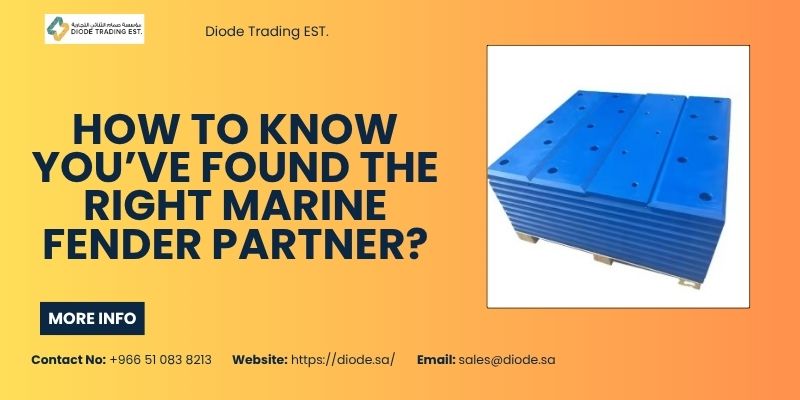
Selecting the right marine rubber fender supplier in Saudi Arabia isn’t just a purchase decision it’s a long-term safety, durability, and performance investment. Ports, shipyards, and vessels rely on fenders to protect assets worth millions. So how do you know you’re picking the right partner? A trusted marine fender manufacturer in Saudi Arabia should meet certain quality and reliability benchmarks that go far beyond price.
1. Proven Track Record with Marine Projects
You want a supplier who has already earned their stripes across Saudi Arabia’s maritime sector especially across oil terminals, ports, and industrial berths. A reputable supplier doesn’t just display products; they share successful case studies, client references, and on-site project expertise.
- Look for experience in commercial ports, naval docks, offshore platforms
- Request previous project photos and performance reports
- Ask for references from marine sector clients
According to data from the U.S. Bureau of Transportation, damage during vessel berthing contributes billions in global repair costs yearly (bts.gov). That means your supplier’s past performance matters a lot.
2. International-Standard Quality Certifications
Marine rubber fenders aren’t ordinary rubber blocks. They must withstand UV exposure, corrosion, extreme loads, and salt-water environments. Your chosen supplier should follow global quality standards such as PIANC and ISO. These certifications signal engineering accuracy, material reliability, and safe berthing capability.
- ISO 9001 and ISO 14001 compliance
- PIANC regulatory standards
- Independent lab testing and QC documentation
These aren’t “nice-to-have” they’re fundamental when safeguarding vessels and harbor infrastructure.
3. In-House Engineering and Custom Manufacturing
Every marine facility has different berthing forces, vessel sizes, and environmental factors. A reliable rubber fender manufacturer in Saudi Arabia should offer engineering expertise not just catalog sales.
Look for suppliers who:
- Provide engineered berthing calculations and CAD support
- Offer custom fender sizes and material blends
- Assist in selecting steel frontal panels and UHMWPE pads
- Provide lifecycle performance analysis
Just showing samples isn’t enough the right partner helps you design and optimize your marine fender system for maximum service life.
4. Transparent Testing, Warranty & After-Sales Support
Top suppliers back their quality with written guarantees and real-world proof. Warranty terms, test reports, and quality certificates shouldn’t feel like a secret file they should be accessible and transparent.
Key support signals:
- Factory testing reports (compression, shear, material density)
- Detailed installation guides & onsite assistance
- Repair and maintenance support
- Long-term warranty & performance documentation
Your supplier should stay with you beyond delivery not disappear after issuing the invoice.
5. Technical Guidance & Real Marine Knowledge
A knowledgeable supplier doesn’t just sell they educate. They can explain fender selection, berthing energy, reaction forces, and installation best practices. They may even reference industry studies like How Do Marine Fenders Safeguard Naval Vessels during Docking? to help customers understand safety standards.
Bonus points if they provide technical audits, site visits, and custom proposals because every jetty, quay, and slipway needs a tailored solution.
FAQs
1. What certifications should a marine fender supplier have?
Look for PIANC standards, ISO certifications, and documented lab testing. These ensure your fenders meet global performance benchmarks.
2. How long do marine rubber fenders last?
With proper materials and installation, high-quality fenders typically last 10–20 years depending on environmental conditions.
3. Why is engineering support important when buying fenders?
Engineering support ensures your fenders match vessel load cases, berthing energy, and jetty design reducing damage and extending equipment life.
4. What is the difference between rubber and composite marine fenders?
Rubber fenders provide flexible energy absorption, while composite and UHMWPE frontal panels offer low-friction, high-strength wear surfaces for large vessels.
Final Thoughts
Choosing a marine rubber fender supplier isn’t something to rush. Look for engineering competence, real-world installations, transparent testing, and responsive after-sales service. When your port or vessel’s safety is on the line, you deserve a partner not just a vendor.




